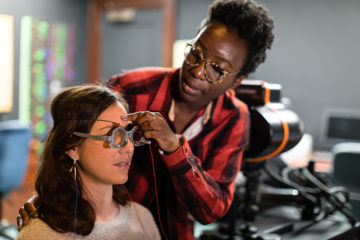
Concentrations
Students like to have the chance to customize their educational experience, and selecting a concentration is one way of doing so. Concentrations can help you develop strong skills within a specialty and support a career path.
Students are selected for the concentration programs in the spring of the first year. Students with a concentration follow the four-year OD curriculum. Most participants go on to participate in a residency.
- Pediatric Optometry
- Cornea and Contact Lens
- Low Vision Rehabilitation
Program Highlights
- Faculty mentor in your area of specialty throughout your time at NECO.
- Targeted coursework in area of specialty including Special Populations courses and electives throughout the four-year OD program.
- Focused clinical placements, including placement with mentor, and at least one fourth-year rotation placement.
- Seminars outside of class.
Requirements and Application
Interested students are required to schedule and complete a clinical observation with a specific faculty member; have a GPA above 3.0; and specific experience or interest in the subject area. Documentation and letters of recommendation from professionals from the specialty area are welcome but not required.
Applications to the concentration program are due February 1 in a student’s first year (spring term).
Choose a Concentration
Pediatric Optometry
The program delivers stronger pediatric didactic and clinical opportunities, with faculty mentorship, throughout the 4 years. This more specialized supplemental program offers better preparation for a pediatrics/binocular vision residency and possibly a future career in academia.
-
Stacy Lyons, OD, FAAO
Pediatric Concentration Director
[email protected]

Cornea and Contact Lens
Students who opt for this concentration will have opportunities throughout their program to engage with faculty mentors and have targeted coursework, seminars and lectures in order to develop skills in cornea and contact lenses while working in a diverse range of clinical settings.
-
Jennifer Liao, OD, FAAO, FSLS
Contact Lens Concentration Director
[email protected]

Low Vision Rehabilitation
Optometrists specializing in low vision rehabilitation focus on providing a multidisciplinary approach to improving visual function and independence in patients living with vision loss. This can be achieved through low vision aids, technology, collaboration with professionals, training on use of residual vision, patient education, and other specialized care.
-
Alexis Malkin, OD, FAAO
Low Vision Rehabilitation Concentration Director
[email protected]

